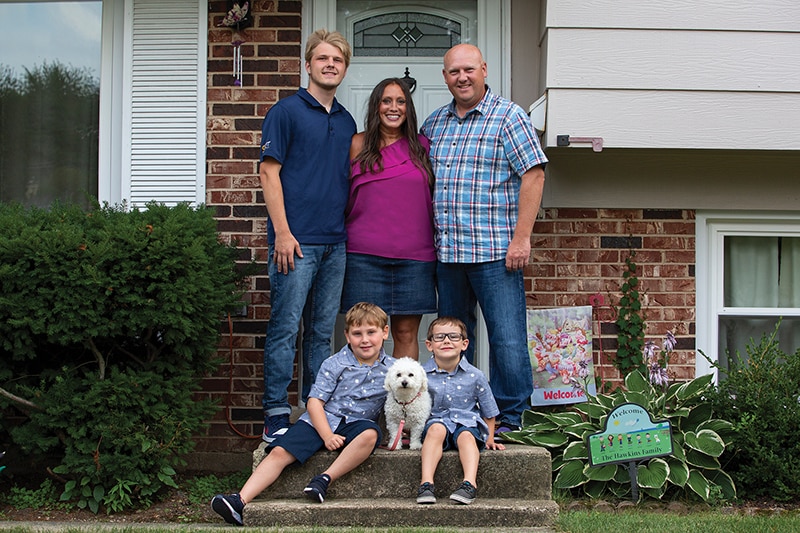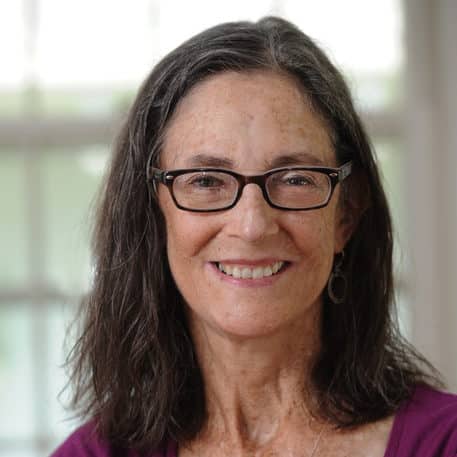While individuals are at greater risk, treatment and screening must continue
Robyn Hawkins is not an anxious person. “But this is a whole different level of worry than I’ve ever had,” she says.
For the 38-year-old Arlington Heights resident, “this” refers to undergoing treatment for stage 4 pancreatic neuroendocrine cancer during the coronavirus outbreak, e-schooling two young sons, worrying that her shortness of breath is a Covid-19 symptom, and being afraid to go out “because of people thinking everything is safe and not wearing a mask.”

Still, Hawkins, a neonatal intensive care unit nurse diagnosed with cancer in 2008, says, “You can lie down and let it take you, or you can fight like a girl.
I choose to fight.”
In the U.S., roughly 1.8 million people find out they have cancer each year, according to the National Cancer Institute. And many people with cancer, both in and out of treatment, have similar concerns about keeping themselves safe, because their weakened immune systems put them at greater risk for Covid-19.
Compromised immune systems
People with cancer have a double-whammy during the coronavirus pandemic. Because of their treatment, which often includes immunosuppressive drugs like steroids, they are at higher risk of serious complications from Covid-19.
In fact, researchers have found that cancer patients with Covid-19 are more likely to develop infections or spend time in intensive care and have nearly three times the death rate of the general population, according to a study published in June 2020 in the journal Cancer Discovery.
“Patients with hematologic cancer, lung cancer, or with metastatic cancer (stage IV) had the highest frequency of severe events,” the study states. Patients with Covid-19 and cancer who underwent surgery also had higher risks of severe events, such as invasive ventilation and intensive care.
The American Cancer Society (ACS) explains that, in general, many people with cancer are susceptible to infections because cancer and its treatment weaken the immune system. Radiation, immunotherapy, and chemotherapy can cause short-term immune system damage, while a bone marrow or stem cell transplant may damage immune system cells for months.
The risk is higher for people in active treatment. “Most people who were treated for cancer in the past (especially if it was years ago) are likely to have normal immune function, but each person is different,” according to the ACS.
Andrea Madrigrano, MD, associate professor of surgery and a breast cancer surgeon at Rush University Medical Center, is especially concerned about the increased risks to “anyone in the first 30 days after surgery, getting active chemotherapy or immunotherapy to stimulate the immune system to fight cancer, and people undergoing radiation.”
Treatment continues
While people with cancer need to be extremely careful to avoid the coronavirus, it’s important not to avoid hospitals at all costs. Cancer patients need to continue their treatments, specialists say.
Julian Schink, MD, chief medical officer of Cancer Treatment Centers of America (CTCA), is concerned that a “dark shadow” of new cancer cases will emerge, due to a decrease in screenings and reluctance to go to the doctor. Nationwide, in a two-week period in March and April, new cancer diagnoses dropped by 37% compared to the previous year, according to an analysis from Strata Decision Technology.
“Cancer doesn’t go away because of [Covid-19],” Schink says. “Eventually their cancer will come out, and it may be more advanced. Many of these cancers — like ovarian, lung, and leukemia — you can’t defer treatment without (the person) getting very sick.”
When individuals avoid seeing a doctor or going into a hospital, they might miss a cancer diagnosis.
For instance, while fever, shortness of breath, and fatigue are symptoms of Covid-19, they can also be signs of leukemia, a blood cancer, says Jessica Altman, MD, director of the acute myeloid leukemia program at the Robert H. Lurie Comprehensive Cancer Center of Northwestern University.
“You may have called a doctor who said if you’re otherwise okay, we will monitor you closely from home, and while that’s an appropriate answer for [Covid-19], it’s not for acute leukemia,” she says.
Moving forward
Earlier in the pandemic, the ACS and the Centers for Disease Control and Prevention said people should delay nonurgent cancer screenings such as mammograms and colonoscopies because of Covid-19.
And a report by the electronic medical records company Epic showed people did just that. In March, screenings for breast and cervical cancer fell 94%, and colon cancer screenings were down 86%, compared to the three previous years. “If the trend continues, the data suggest that many cancer cases could go undiagnosedor be diagnosed at a later stage with a poorer prognosis,” according to the report.
Cancer centers have made changes to safely accommodate patients, and Madrigrano says it’s time to get back on track.
“We do not want to send a message of fear around the healthcare system. The best way to stay protected from the virus is to keep ourselves healthy,” she says.
People who require active treatment need to go into their medical center to get it, Altman says. For others, it might be appropriate to get blood work done closer to home and follow up via telemedicine.
While people with cancer should avoid large crowds, other measures depend on where they are in treatment, which medications they are on, how they perceive risk, and other factors, Altman says.
People with blood cancers, who have weakened immune systems after treatment, were “already isolation experts” when the pandemic hit, Altman notes. They had experience in social distancing, and they knew about the importance of infection control measures, such as frequent handwashing and wearing masks.
As our understanding of Covid-19 evolves, individuals with cancer are learning to adapt and handle their personal risk.
Back in Arlington Heights, Hawkins, a patient at CTCA, goes to the cancer center every 28 days to get hooked up to an intravenous chemotherapy, 5-fluorouracil. It runs for 46 hours.
“I start it at the hospital, and then I come home with it,” she explains. “They trained me how to de-access my port, and they send me home with a kit to flush it and safely store the IV bag.” She also takes an oral chemotherapy drug, Temodar.
Hawkins mentors other patients through the cancer support commu-nity Imerman Angels, telling them, “Only do what [you] feel safe doing and don’t do things just because [society is] opening up.”
Schink says, “I hear some frustration along the lines of, ‘Is this ever going to end?’” But, he says, “Most are a strong, stoic bunch.
They understand the importance of taking care of themselves.”
Originally published in the Fall 2020/Winter 2021 print issue.

Ronni Gordon lives in an old house with an old dog. She specializes in health, dogs, college publications and cancer survivorship.












